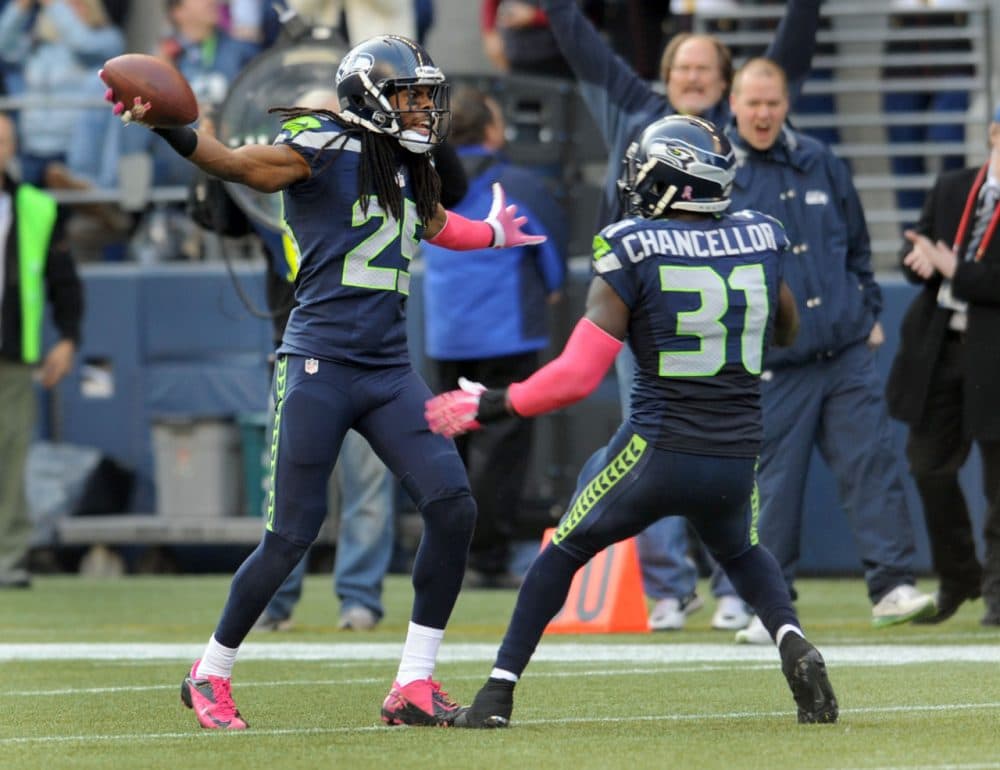Advertisement
Seattle Seahwaks Secondary: More Than 'Fine'

Seattle Seahawks coach Pete Carroll's motivational style is unusual, to say the least, particularly when it comes to how the Seahawks' secondary punishes itself for mistakes through self-imposed fines. But why? Seattle safety Early Thomas explains:
"We love each other," Seattle safety Earl Thomas explained. "It's coming from a good place. It's never to degrade each other, because we respect each other too much. But we want to get better."
The Wall Street Journal's Jonathan Clegg wrote about the Seahawk’s unusual fine structure and he joined Bill Littlefield from Phoenix to explain.
BL: Members of the so-called "Legion of Boom” pay fines for mistakes they make in practice and in games, saying something stupid in team meetings, and dropping potential interceptions. Does it matter if that interception was virtually impossible?
They are pretty ruthless when it comes to enforcing these fines.
Jonathan Clegg, Wall Street Journal
BL: Cornerback Byron Maxwell called the fines “ruthless,” but Mr. Maxwell’s base salary was nearly $700,000 this year and he’s likely to make a lot more than that in the 2015 season. Can he really be motivated by a five, 10 or even 100 dollar fine?
JC: I think that the players are still motivated. Maxwell isn't even the highest earner among them. Earl Thomas the safety, and especially Richard Sherman who just signed a big-money deal last offseason, those guys make millions of dollars a year. You would think that 100 bucks might not seem like the steepest fine, but they say handing over 100 bucks is still handing over $100, and however much money you make, nobody wants to do it. And it does sting when they have to part with the cash.
BL: These fines are not like those handed down by the league, which, of course, are subject to appeal. Who decides which mistakes are worthy of a fine and how much the fine will be?
JC: This is an internal thing that has been implemented by the defensive backs. And it's the DB coach Kris Richard who is the ultimate judge. The fines are sort of assessed during team meetings. I think I chalked it up the Seahawks have almost 100 passes defensed this year. Defensed is when a defensive back gets a hand on the ball and stops it from being completed. But they only recorded 13 interceptions.
So that means there are 70-odd times when they would have been fined $100. So you can imagine the final bill for this thing is upward of $10,000 when you factor in all the dropped interceptions and mistakes as well.
BL: So, we’ve established these fines are motivating, but they can’t be the only reason the Seattle is so good in the secondary, can they?
[sidebar title="Complete Super Bowl Coverage" width="630" align="right"]From a profile of the game's head referee to the 21st edition of Super Bowl Haiku, you can find all of our coverage right here. [/sidebar]JC: No, absolutely not. I think the fines really are more a reminder of the standards the defensive backs set for themselves. This is the league's elite unit in the secondary. And I think the fine system is just a way of reminding themselves that remaining on top requires concentration and focus everyday.
It's interesting: the fines aren't just imposed during games. Even sort of simple mistakes, or not paying attention during meetings, these are all the things the Seahawks have to do to remain on top. So I think it's really just as much about that as it is with coming down with difficult catches or anything like that.
This segment aired on January 31, 2015.